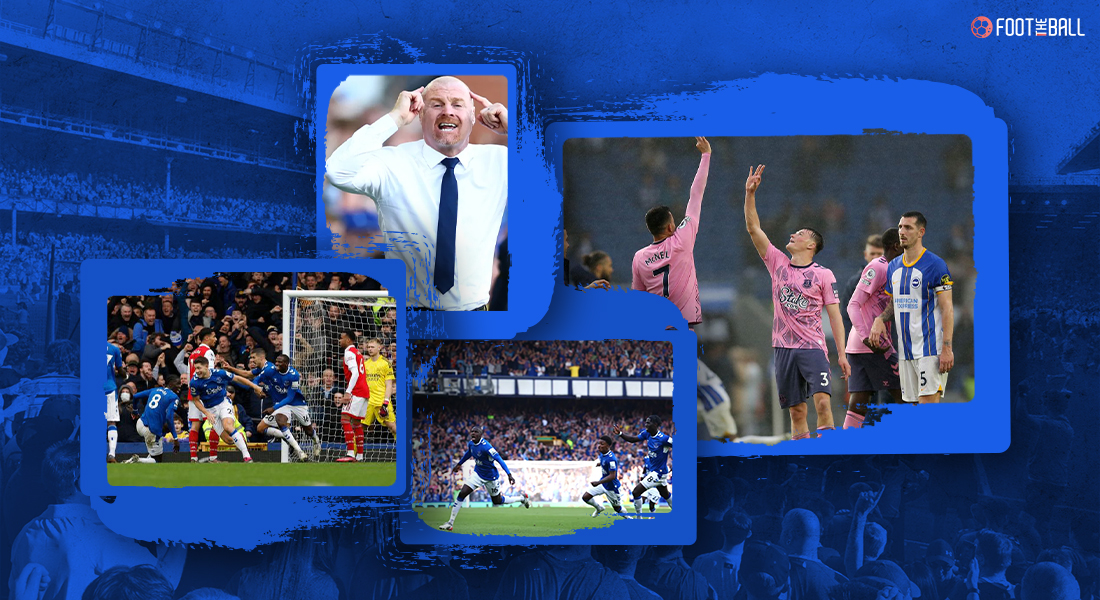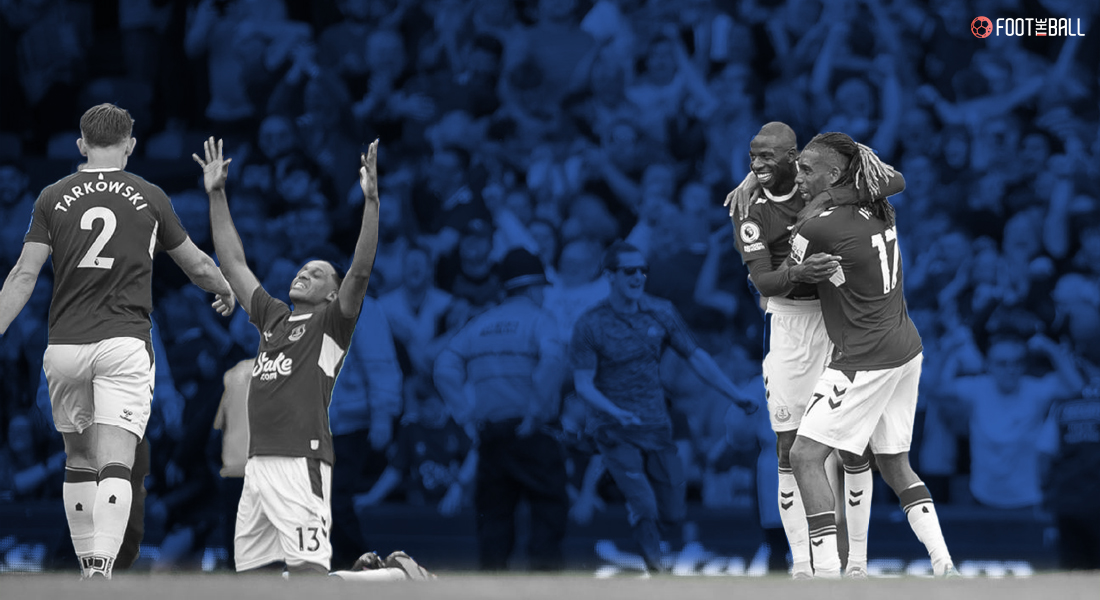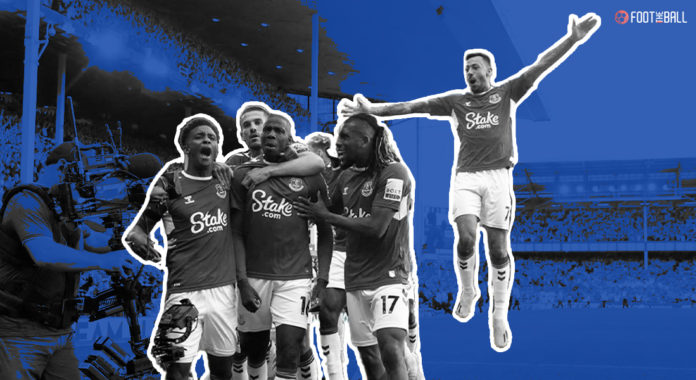€662.72 million. That’s the sum Everton have spent over the last seven years to take themselves to the next level and challenge the top Premier League teams. Instead, what has followed are close shaves with relegation for the past two seasons. The club finished four points from safety in the 2021–22 season and just two points in the recently concluded season.
Being in a relegation battle rings the alarm bells at any club, as going down has serious economic repercussions. However, even being in one starts to impact the players psychologically.
After the relegation of Watford F.C. last season, Stake.com must be breathing a sigh of relief as their other partner, Everton, narrowly avoided the same fate – an example of how psychological strength can make a critical difference.
However, just because they survived the threat of dropping into the Championship doesn’t mean they can breathe easily. With an influx of new teams making it into the Premier League in 2023/24, it is hard to say if a storied club such as Everton can keep their head above water following one of their worst seasons.
Just look at Nottingham Forest, who went all out and spent €171.2 million after promotion and finished above Everton. This will not only psychologically affect the players but also the club’s administration, who know they could likely get relegated if they do not get their act together.
So, how much psychological impact were the Everton players? Stats from the Premier League’s official website shows that they made nine errors that led to goals, the most by any team in the league. And these errors came from players such as Idrissa Gueye (3), one of the most sought-after Premier League midfielders; Jordan Pickford (2), England’s starting goalkeeper; Conor Coady (1); former Wolverhampton Wanderers captain and Seamus Coleman (1) the club captain.
These all are perhaps the best and most experienced group of players at the club, and the fact that they were the ones making the mistakes shows the psychological pressure of a relegation race which can rattle even the best of the lot.
It is a great deal of pressure for any club to find themselves in a relegation zone but for Everton, it was an even more disastrous situation. They strongly resemble a side that can easily finish inside the top ten on paper. However, the psychological effect is so much that such a team ends up scoring only 34 goals, the second-worst in the league.
Role of Psychology in Sports
With the rise in competition and the money involved in sports, especially football, teams and players alike look for even the smallest areas for improvement, giving them an edge over their rivals. And improving mental strength is one area where clubs are pouring millions. Take the example of Liverpool, who employed the services of German Neuroscientific data company Neuro11 to make their players mentally stronger to handle the pressures of big games.
Speaking on the impact it had on the Liverpool squad, Jurgen Klopp said, “We are now able to specifically train the mental and shot-precision abilities of our players directly on the pitch, in a way that wasn’t possible for us until now”.
“Since mental strength plays such an important role at the highest level, we’re excited about working together with these guys,” he added.
However, the perfect story for how psychology can make or break a club is analysing Leicester City from 2014-2017. These three reasons would show us the power of having a squad of mentally strong players and the downside when the same players become psychologically vulnerable.
After 29 games in the 2014-15 season, Leicester City were on 19 points last on the table and looking certain favourites to be relegated. However, seven wins and one draw in their last nine games helped them complete one of the best relegation escapes ever.
This provided such a strong dose of psychological boost that the same group of players, now joined by a certain N’Golo Kante, would go on to win the title. The following season though, they would witness a dramatic downfall with the manager Claudio Ranieri getting the sack.
After their winning season, Ranieri was advised to hire a sports psychologist, which would help the club as they were looking to establish themselves as a top force. However, the manager dismissed the suggestion. “When you are young, maybe you need somebody who can help you, but now you are a man. In life, you need to be strong. Psychologists? No.,” he had said.
So, Leicester, in two years, got both the long end and short end of psychological strength, which shows how in modern football, the difference between success and failure can be minimal.

The pressure of the relegation battle
As mentioned earlier, a relegation battle is not for the faint-hearted, and there are good reasons for it. From a broadcasting perspective, the English league generated by far the highest revenue, which is then distributed to the team. Even a team in the bottom half of the table can receive more than €100 million in a single Premier League season. That amount is cut down by half if the clubs get relegated.
Relegation also causes other disastrous consequences that affect the players. For example, a player of James Maddison’s calibre will surely be signed by a club in the Premier League, but there will be several others, including some first-team starters, who will be hard-pressed to find a new club.
These are all the scenarios that play into a player’s mind when they are in a relegation battle. With performances and results not improving, even the fans can turn on the team, and there can be an unhealthy situation inside the dressing room with the manager not being in a position of authority to get the best out of players.
A look at Everton’s stats this season shows us a glimpse of how the pressure of a relegation battle can affect the team’s performance. The Toffees were woeful in front of the goal, with their top scorer Dwight McNeil scoring only seven goals. This is the second-worst for a team in the league.
In addition, the team also missed 47 big chances being the only team in the bottom six to miss more chances than the goals they scored. Another shocking stat from their atrocious season revolves, which shows their attacking woefulness, is comparing their goals conceded and scored.
In the 38 games they played, the team conceded two goals in 13 games but scored two in a mere four games. This comes from a team that has McNeil Alex Iwobi, Neal Maupay, Demarai Gray, and Dominic Calvert-Lewin in their ranks, showing that even a seasoned attack can be of no use if they find themselves short of confidence and mental strength.
Read more:
- Manuel Ugarte: Talented midfielder set to be PSG’s newest signing
- Ilkay Gundogan’s next club: Five potential options for the German midfield maestro
How did Everton survive the drop?
When faced with a threat of relegation, teams either come fighting back or fold. Thankfully, Everton rediscovered their form to some extent, taking eight points from their last five games. During these runs of games, their defence improved significantly. Stats from Understat show that Everton were expected to concede 9.33 goals but only let in seven goals. In fact, their points haul in May was the seventh-best in the league. Meanwhile, Leeds and Leicester City were the second and fifth worst-performing teams during the same period, respectively.
What came to Evrton’s rescue was that their brilliant team, even for a short span of games, managed to put in performances more reminiscent of their talent and experience. Examples of this can be seen in their brilliant performances, like on the road to Leicester, where they came back from 2-1 down to level the game, a result which ensured that Leicester City stayed below them in the Premier League table.
This provided them with a boost, and the team thrashed Brighton & Hove Albion 5-1 away. This was the only time the Toffees scored more than two goals in a game in the entire season.

In conclusion, Everton survived the drop because out of all the three teams (Leeds, Leicester and Everton), they were the best-equipped and best-placed team to stay in the league. An interesting thing happened when the club appointed Sean Dyche as the manager in a desperate bid to avoid being relegated. One of the first things Dyche did was give the players and staff a questionnaire asking for steps the team should take to improve results. This gave the players a boost of confidence, instilling them with the belief that despite their woeful showing so far, the new manager was more than happy to trust their advice and put it to good use.
It worked wonders as Everton won against then-league leaders Arsenal and also secured an away draw against Chelsea. Dyche’s method was not a magical pill that immediately improved results, but those measures did deliver when the team needed them the most.
What next for Everton
After their win over Bournemouth, which guaranteed their Premier League stay, Sean Dyche made it bluntly clear that he was far from happy with the current situation at the club. Speaking to the media, he said, “It’s a big club, make no mistake. Big history, big club, but we are not performing like a big club. We have to find a way of changing that. This is two seasons now.”
“It’s a horrible day for all concerned; there is no joy in it for me other than getting the job done,” he added. And he says this with good reason. Being in a relegation scrap for one season can be blamed on luck or situations outside the club’s control. However, being in back-to-back relegation scraps shows a deeper rot at the club, both at the team and administrative level, that needs to change.
The immediate challenge is to be in the best position possible for the next season, as the competition will only get stronger. Promoting youth talent might be the first task combined with selling some of the non-performers, which would also improve the team’s financial losses.
However, significant improvement has to come on the mental strength front. The following season we will see teams such as Luton Town, who became the first team to go from non-league to Premier League football and will not be short on confidence to take on any team.
After last season’s brush with relegation, Everton fans had high hopes that things would change in the summer. However, an even worse season has proved that the club are in a bigger mess than earlier perceived. Over the summer, the club has to make several decisions, majorities of which should also be right for them not only to survive but also to thrive in the Premier League.
The only silver lining is that Sean Dyche has made massive strides with the team in four months. So, having an entire summer transfer window to improve the squad will only make the team better equipped to deal with the challenges ahead. The team always had the talent and the legacy on their side. The key is now to get that psychological edge back.
For now, though, the club can reveal that having avoided the nightmare scenario not once but twice.




